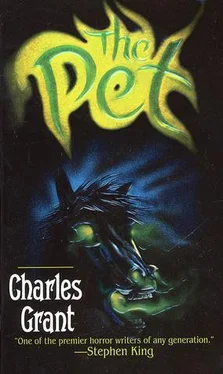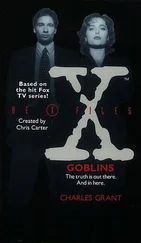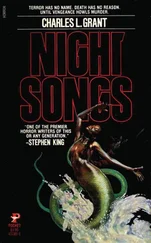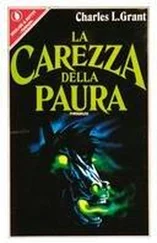“Oh, Don,” Tracey gasped as he helped her to her feet. “Oh, god, I was so frightened.”
“Yes,” he said, and headed for the path, pulling her behind him until she had to run to catch up.
“Don! Don, what.
He didn’t answer. A single urgent look, and he began to run again, not fast enough to outstrip her, but fast enough to get him past Jeff’s car before anyone noticed it was there. He swung left, toward home, and Tracey followed with one hand gripping her torn shoulder. There were no questions, and he was glad because he wasn’t sure he really knew what he was doing.
The police were gone. The yards and houses were dark. He puzzled at the plywood nailed over the bay window, but he didn’t stop to look. He rushed up the steps and grabbed for the doorknob.
“Oh, shit!” he yelled, thumping the door with a fist. “Damn, it’s locked.” He turned and started down, hesitated on the walk before pulling Tracey with him into the garage. The door here was open, and he stumbled into the kitchen, staggered down the hall. He didn’t look at the living room wreckage, didn’t feel the cold saturating the walls, but hauled himself up the stairs and into his room.
Tracey came up behind him, her eyes glazed with pain.
Don switched on the light and looked at the poster over his desk. “Oh, god,” he said.
The trees, the lane, and there at the back, the stallion frozen in running.
I’m sorry , he thought; I’m sorry.
And he ripped it from the wall, crumpled it into a ball, and ran downstairs again and into the kitchen. After two hapless attempts he managed to turn on the stove and held the poster over the flame until it caught in several places.
“Don? Don, help me.”
When he felt the fire begin to scorch his wrist, he dropped the burning paper into the sink and watched it char, watched it flare, watched it spark and crackle and sink into paper embers.
“Don, please help me.”
“Yeah,” he said. “Don the Superman to the rescue.”
A cool night in late October, a Sunday, and clear — a bold harvest moon pocked with grey shadows, and a scattering of stars too bright to be masked by the lights scattered below; the chilled breath of a faint wind that gusted now and then, carrying echoes of nightsounds born in the trees, pushing dead leaves in the gutters, rolling acorns in the eaves, snapping hands and faces with a grim promise of winter.
A cool night in late October, a Sunday, and dark.
… and so the boy, who really wasn’t a bad kid but nobody really knew that because of all the things he had done, he looked up in the tree …
“Don, for god’s sake, give me a break, okay? I’m not one of those dumb little kids of yours, you know. I don’t believe in fairy tales.”
He laughed silently at the telephone and snuggled closer to the wall, stretching his legs out until his bare feet were braced against the staircase. The chill of the wood felt good against his soles. “I thought you liked my stories. I thought you needed something to take your mind off things.”
Tracey groaned loudly. “I’m in pain, Vet, remember? I am a patient of the only hospital in the world that serves food the Geneva Convention banned from World War Two. And I am not supposed to be tortured.”
“Torture?” he said, his voice high-pitched and insulted. “I don’t recall you ever thinking I was torture before.”
“I didn’t say you,” she answered softly. “I wasn’t talking about you.”
“I know,” he said just as softly. “That was a joke.”
“Oh.” A pause. She forced a laugh. “I see. A joke.”
Water ran in the kitchen. He looked in and saw his father at the sink, a towel over his shoulder, an unlighted cigarette dangling from his mouth — the same thing he had been watching for the past three days.
“Well, listen,” Don said.
… and he saw the crow sitting on the highest branch in the biggest tree in the world. A big crow. The biggest crow he had ever seen in his life. And the boy knew, he really and truly knew, that the crow was going to be the only friend he had left in the world. So he talked to the crow and he said …
“Enough,” Tracey pleaded with a laugh. Then, abruptly solemn, “Please, Don. No more. You promised me no more.” He sighed and nodded. “All right.”
“Are you okay?”
“I’m supposed to ask you that, remember?”
“You know how I am. I want to know how you are.” He was fine , he thought, all things considered . After he had taken Tracey to the hospital in the station wagon, fighting the rain that washed in through the broken windshield, he had waited until they had brought Jeff in as well. A concussion and some deep lacerations, he was told, nothing more, and his statement to the police had been accepted without question — he had gone for a walk after leaving his father, and saw the results of the accident, ran home to call since it was only a block away, and found Tracey wandering around in a daze. He supposed, when he was asked, they had skidded during the storm.
His mother was still unconscious, and Dr. Naugle had put him in charge of his father. To get some sleep, some food, so he would be ready when she woke up.
“Don, I have to go. The wardens have come with the pills.”
“All right,” he said. “I’ll come around tomorrow.”
They rang off, and he wandered into the kitchen, watched his father silently, then went up to his room. He was exhausted, and he dropped onto the bed and fell asleep almost instantly, not waking until after midnight to undress and sleep again.
At school on Monday he spoke to no one, avoiding their puzzled eyes, cutting biology when he saw the substitute at the head of the room. He ran for an hour afterward, feeling oddly distanced from the sound of his feet on the red cinder track, as if he were floating through a tunnel, looking for someone he knew he wouldn’t find. Then he went home to fix his father’s supper. Norman ate little, smoking as he did, finally pushed his plate away and left the room without a word.
Don didn’t follow. He rinsed off the dishes, dried them and put them in the cupboard, then went upstairs to change his clothes for the evening visit to his mother, Jeff, and Tracey. When he came down again, Norman was at the door, impatiently jingling the keys to the car he had rented while the station wagon was being repaired.
“You know,” he said as he drove through the wet streets, “you seem awfully calm these days.”
“And it seems to me you’re spending an awful lot of time with that girl.”
“She’s a friend. So’s Jeff.”
“And your mother is your mother. I think it would help if you stick around her room a bit more.”
“Okay.”
He could feel his father look at him, not quite glaring, but he didn’t much care one way or the other. He had been trying to sort out everything he felt, and it bothered him that he couldn’t make up his mind whether or not he should feel guilty. He was afraid something had happened to him that night in the park, and just as afraid that he might blurt out the truth and be considered a case for the men in the white coats. His father, on the other hand, had spent a lot of time on the phone — with the mayor, with several board members, and with Dr. Naugle. Don was ashamed to think Norman was more worried about the mayor.
On Tuesday Jeff was released and showed up after school to watch him run. There were questions, but he didn’t ask them, and Don soon stopped worrying about what the boy had seen. Even if it had been just a glimpse, it could easily be explained as an aftereffect of the accident.
On Wednesday he decided not to use the track but to walk home right after last class. There was homework to do, and his father would have to go to see his mother alone.
Читать дальше












